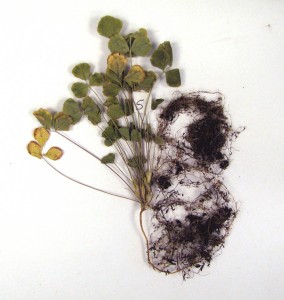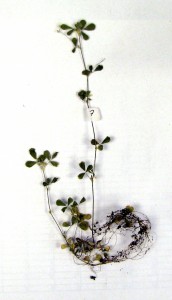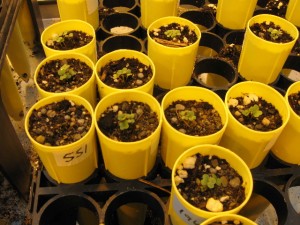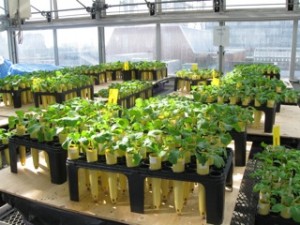Anyone who's taken an intro-level science course at U of T is familiar with the undergrad science lab: it's big, it's hairy, it appears every other week in three-hour segments, and it leaves you feeling that while you've learned some hard skills (do not pour water into acid!), you haven't necessarily picked up a whole lot about what constitutes the real material of experimental science. Much rarer is the elusive and mysterious beast popularly known as the scientific process, the means by which questions about the world are transformed into statistically significant statements, and perhaps eventually translated into theory.
Some of you may know that as the grand finale to my
see-saw of an undergrad career, I've just switched over to biology, giving myself a year to finish a bio major (yikes!). In that time, my goal is to get at least a somewhat tangible idea about the scientific process: what goes into creating scientific hypotheses, planning and implementing experiments, and (scariest of all) understanding the statistical applications that make sense of everything. Because I'm seeking answers to these questions, I applied to work in one of the school's EEB labs, which is how I ended up volunteering in the
Stinchcombe lab. In an attempt to describe in fewer than four thousand words the benefits of this endeavour, I've compiled a short list of some of the already discovererd highlights of working there:
a) In a half-day of safety training (free pizza at lunch) I learned that to make fire extinguishers work,
you must pull out the little pin. Also, don't get an
HF burn unless you really want to rid yourself of your bones.
b) I've learned how to use an autoclave, which means I can start to sterilize stuff. My boyfriend keeps suggesting, with sidelong glances at the kitchen counter, that I bring our dirty dishes to school.
c) I've been meeting undergrad and grad students who work in the lab. This is definitely the most interesting part of the experience so far. They're all friendly, and have all had things to say about studying science at the graduate and undergraduate level. Plus, they don't seem to mind if I ask them [probably naive] questions about their studies and their experiments.
d) I will never forget how to
re-zero a scale. It's only my second week, but already I've become a proficient: I've been weighing dry plants with verve.


e) I've been introduced to the
rooftop greenhouses above the Earth Sciences building. While helping a PhD student from another lab,
the Weis Lab, plant mustard seeds one morning, I had more opportunity to ask a bunch of questions.


f) I've learned that there are
hot fridges, big walk-in ovens where plants are kept dry. Also, certain hallways in the basement of the Earth Sciences building smell a lot like real farm fields — not the manure part of farm fields, but the plant part — which makes me feel a little nostalgic for school, despite the fact that I haven't yet flown the U of T nest.
All in all, I'm feeling optimistic. It's only been two weeks and I've already learned a lot. While I can't expect a volunteer position (or the people who work in the lab) to provide me with all the answers to my questions, it seems like a great place to get an introduction to how science works outside the realm of the inorganic three-hour undergraduate lab.
For others looking to get experience in labs, there are numerous paid and unpaid lab positions available through the school, thanks to the
work-study program. To get a paid position, which involves working directly through the university's various departments, you first need to go (virtually or in the flesh) to the
Career Centre, where something like 1,357 job postings can be found. You must have qualified for OSAP to be eligible for work-study, and you have to apply before October 30. While I've been warned that most of the positions get filled within the first couple of weeks of class, there are still a few employers accepting résumés. There are also volunteer positions, if the jobs are taken up or you're unable to commit for both school terms.
- Mary

 e) I've been introduced to the rooftop greenhouses above the Earth Sciences building. While helping a PhD student from another lab, the Weis Lab, plant mustard seeds one morning, I had more opportunity to ask a bunch of questions.
e) I've been introduced to the rooftop greenhouses above the Earth Sciences building. While helping a PhD student from another lab, the Weis Lab, plant mustard seeds one morning, I had more opportunity to ask a bunch of questions.

 f) I've learned that there are hot fridges, big walk-in ovens where plants are kept dry. Also, certain hallways in the basement of the Earth Sciences building smell a lot like real farm fields — not the manure part of farm fields, but the plant part — which makes me feel a little nostalgic for school, despite the fact that I haven't yet flown the U of T nest.
All in all, I'm feeling optimistic. It's only been two weeks and I've already learned a lot. While I can't expect a volunteer position (or the people who work in the lab) to provide me with all the answers to my questions, it seems like a great place to get an introduction to how science works outside the realm of the inorganic three-hour undergraduate lab.
For others looking to get experience in labs, there are numerous paid and unpaid lab positions available through the school, thanks to the work-study program. To get a paid position, which involves working directly through the university's various departments, you first need to go (virtually or in the flesh) to the Career Centre, where something like 1,357 job postings can be found. You must have qualified for OSAP to be eligible for work-study, and you have to apply before October 30. While I've been warned that most of the positions get filled within the first couple of weeks of class, there are still a few employers accepting résumés. There are also volunteer positions, if the jobs are taken up or you're unable to commit for both school terms.
- Mary
f) I've learned that there are hot fridges, big walk-in ovens where plants are kept dry. Also, certain hallways in the basement of the Earth Sciences building smell a lot like real farm fields — not the manure part of farm fields, but the plant part — which makes me feel a little nostalgic for school, despite the fact that I haven't yet flown the U of T nest.
All in all, I'm feeling optimistic. It's only been two weeks and I've already learned a lot. While I can't expect a volunteer position (or the people who work in the lab) to provide me with all the answers to my questions, it seems like a great place to get an introduction to how science works outside the realm of the inorganic three-hour undergraduate lab.
For others looking to get experience in labs, there are numerous paid and unpaid lab positions available through the school, thanks to the work-study program. To get a paid position, which involves working directly through the university's various departments, you first need to go (virtually or in the flesh) to the Career Centre, where something like 1,357 job postings can be found. You must have qualified for OSAP to be eligible for work-study, and you have to apply before October 30. While I've been warned that most of the positions get filled within the first couple of weeks of class, there are still a few employers accepting résumés. There are also volunteer positions, if the jobs are taken up or you're unable to commit for both school terms.
- Mary
My labs in first year were so stressful. Especially Chemistry, because if you messed up the experiment, you wouldn’t have time to start over again.
I feel that once the novelty wears off, research becomes a painstaking and tedious process yielding either euphoria-inducing results, or nothing. The immense possibility of your 1/100000000 contribution to humanity is so enticing, almost like, it’s the sure way to leave your legacy. But the sacrifices…and the mildly manic depression it often induces…~sigh~
As you can probably tell, I’m feeling slightly bipolar about my own research project (a 499 independent research study) myself. Most because I had just spent a whole Saturday running experiments and the results and feedback I got back today were pretty heartbreaking. And I’ve been told many, many times that this is only the tip of the iceberg. It can be so much worse…I just haven’t been lucky enough to experience it yet. 0_0
Your plant lab sounds fascinating though. I wish I had taken more plant/EEB courses…I have a feeling that I might’ve enjoyed them!
@Lori: In first year, I joined a FB group called “I got molested by chemistry”. And it’s the honest truth. 🙂
I can imagine that research could get frustrating, it seems very complicated. Reading scientific articles always leaves me astounded at the number of skills different researchers have, and how those all come together as compact ideas that seem obvious or intuitive only after having read the article. Hopefully by the end of your research project you feel the elation, Lucy.
Lori: yes. Thos chem labs are super scary. Perhaps I need to join a FB group too.
HAHAHA don’t let the papers fool you. It all starts off with having an idea, but by the time you are ready to publish, you are mostly likely going to spend most of your time perfecting the figures for submission. I used to think that papers get pumped out just like that…you want to find out about something, design a couple experiments and get a few sets of data that sufficiently prove your point. In reality, everything’s been tried and tried again and altered and perfected over a long, long time (could take a few years), especially optimizing for the best results because it’s really luck and hard work and intuition and kind of a trial and error process from time to time. I dunno…the good thing is that it’s so mentally stimulating and the learning curve is always so steep, which I like. It feels good when things make sense and pieces of a puzzle come together. 😀
My issue is how do you know which supervisors are still accepting resumes for Work-Study? If I e-mail to ask, I’d rather send my resume/cover letter along while I’m at it, but taking time to tailor it only to find out position has been filled? Thoughts?
Hi Karen,
For the two labs I’ve worked in to date, I got in touch with the professor and PhD student by first writing an introductory email, asking about the hiring situation and describing my interest in their labs. I got this volunteer position by emailing the professor after reading on the EEB website ( http://www.eeb.utoronto.ca/undergraduate/jobs ) that he was hiring summer workers. With work placement ads posted around school or online, I’m sure you could just email the teachers and inquire, including an introductory email stating your interest in working there. Adding a resume will probably save them time, but it’d be a lot of work to tailor it each time you apply.
Good luck with it!
Mary